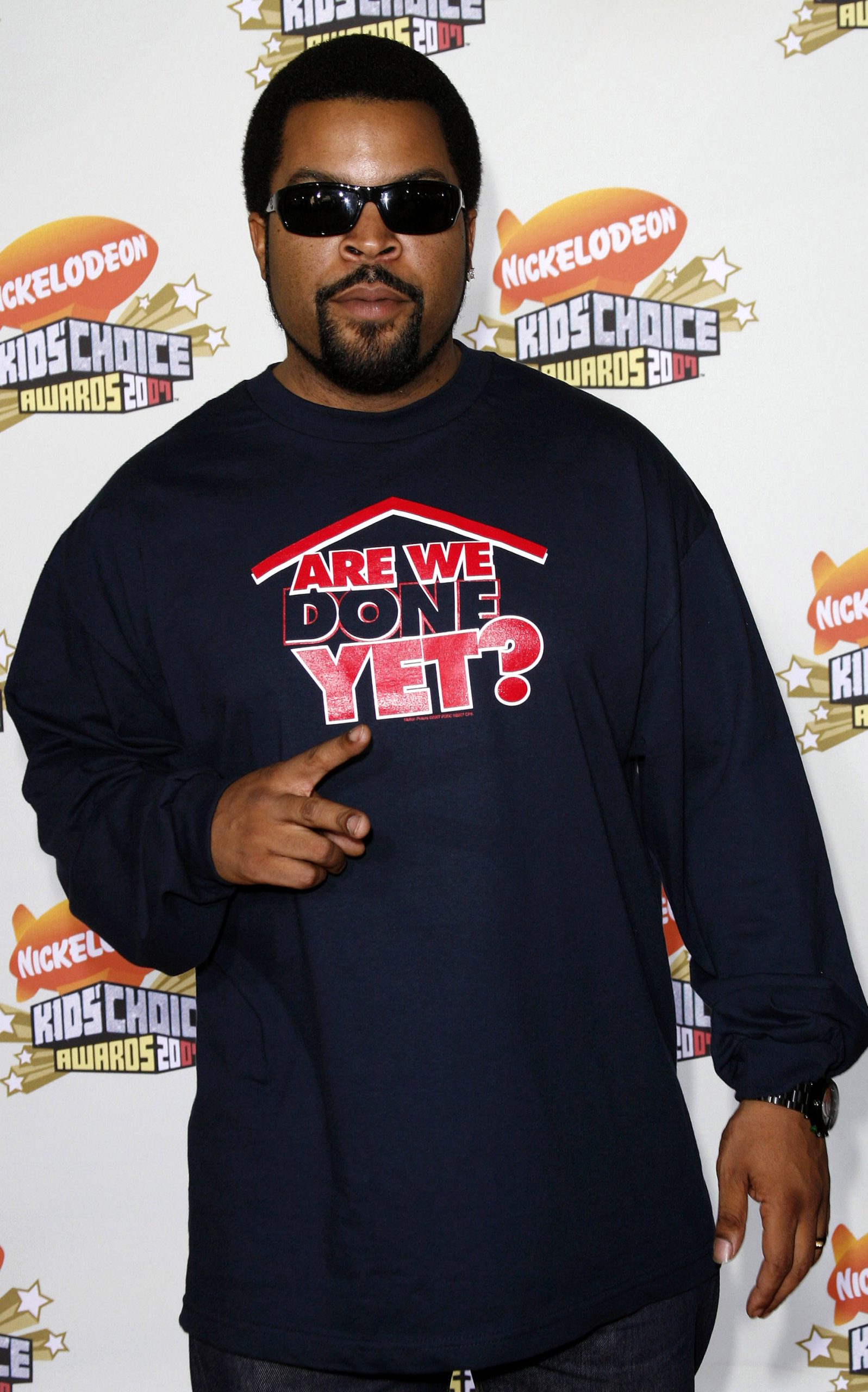“Companies should be extremely cautious about using a celebrity’s name, image or likeness (or in combination, “persona”) in a public communication without his or her permission…. [U]se of the celebrity’s name could be considered not only a violation of a right of publicity or a false association with the celebrity under state laws but a form of trademark infringement.”
 The multi-talented Ice Cube famously said “It was a good day” in his hit song of the same name. But the hip-hop icon and his team probably weren’t having a good day when they saw a digital ad featuring an image of Ice Cube and an altered version one of his most famous lyrics—that he claims was posted without his knowledge or consent.
The multi-talented Ice Cube famously said “It was a good day” in his hit song of the same name. But the hip-hop icon and his team probably weren’t having a good day when they saw a digital ad featuring an image of Ice Cube and an altered version one of his most famous lyrics—that he claims was posted without his knowledge or consent.
On March 31, 2021, Ice Cube (also known as O’Shea Jackson, Sr.) filed a lawsuit against Robinhood Financial LLC, and Robinhood Markets, Inc., financial services providers, alleging Lanham Act violations as well as violations of California law, including misappropriation of likeness and unfair competition.
He is just the latest celebrity to seek to protect his/her rights of publicity (giving a person commercial control of their name, image and likeness) through legal action. Based on outcomes of well-known cases filed by basketball legend Michael Jordan, film/TV actress Katherine Heigl, and beauty and style mogul Kim Kardashian West, Ice Cube would appear to be on well-trod legal ground in his court battle with the trading app.
Hip-Hop Heavyweight Takes on Hipster Startup
Ice Cube’s complaint alleges the Robinhood® website and app advertised using a photo of Ice Cube with the caption “Correct yourself, before you wreck yourself,” a tweaked version of a lyric from the artist’s hit song “Check Yo Self”. But the rapper claims Robinhood did so without his permission and that by using his likeness and altered lyrics, created the false impression that Ice Cube endorsed Robinhood’s products. In the complaint, filed in U.S. District Court for the Northern District of California, Ice Cube’s attorneys noted that Robinhood has engaged with celebrity endorsers such as Jay-Z, Nas and Jared Leto. Thus, the complaint claims the ad gives the impression that Ice Cube is just the latest celebrity to endorse Robinhood’s products.
The complaint also alleges that Ice Cube wasn’t chosen at random, and that Robinhood targeted the rapper “in an act of unmitigated gall and transparent retribution.” Ice Cube’s business partner Jeff Kwatinetz is leading a class-action lawsuit against Robinhood after the company restricted trades on certain stocks.
Ice Cube’s complaint criticizes Robinhood’s targeting of Ice Cube, stating: “Just as Robinhood’s recent well-known conduct has resulted in Congressional investigations and numerous class action lawsuits, so too has it stolen and diminished the hard-earned image and brand of Ice Cube, one of the most prominent Black voices in America.”
Yahoo! Finance reported that a Robinhood representative has responded, saying it did not use Ice Cube’s image improperly because “The image was licensed and used for non-commercial, editorial purposes in connection with a blog article.”
The lawsuit seeks to stop Robinhood from using Ice Cube’s image, as well as unspecified monetary and punitive damages.
Prior Celebrities to Stake Claim to Rights of Publicity in Lawsuits
In rights of publicity cases, plaintiffs point to the value of their image as a brand. Ice Cube’s attorneys note in the complaint not only his 30+ years of work as a musician and actor, but also his role as an entrepreneur and social justice activist. In each of these instances, it follows that Ice Cube’s fame and respect gained in the public eye have made him an attractive business partner and spokesperson. Thus, the name and image of Ice Cube are valuable assets.
Such considerations also came into play in two lawsuits filed against grocery store chains by Michael Jordan for misappropriation of his brand in “traditional” (print) media.
In the first, Mr. Jordan alleged that a Chicago-area grocer Dominick’s Finer Foods ran a magazine ad congratulating the Chicago Bulls legend on his 2009 induction to the Basketball Hall of Fame, which featured the words “Congratulations Michael Jordan” along with Jordan’s jersey number 23 (in the Bulls’ red and black colors)—along with a $2 coupon for steaks. Mr. Jordan subsequently sued the company on state and federal trademark grounds, claiming the grocery store did not have his permission to use his name or likeness in an ad. The lawsuit claimed that the ad undercut Jordan’s hard-earned (and highly lucrative) value as a celebrity endorser. Forbes, in considering Mr. Jordan’s successes, estimated in 2020 that Mr. Jordan has earned an estimated $1.7 billion through his endorsements of well-known brands such as Nike® and Gatorade®. He is still believed to continue to earns many millions annually through such deals, even though he has been retired from on-court competition for nearly two decades. Mr. Jordan’s lawsuit claimed the attached steak coupon in the grocer’s magazine spread erased any doubt that the published page was an advertisement, and not simply a public congratulatory message.
He filed a nearly identical lawsuit against a second Chicago-area grocer operating as Jewel-Osco supermarkets for a similar congratulatory magazine ad (although one without any coupon). The grocery store chain defended itself on First Amendment grounds, saying their ad was protected non-commercial speech. The District Court initially sided with Jewel, noting that, unlike the Dominick’s ad, the Jewel ad did not propose a specific commercial transaction. But the U.S. Court of Appeals for the Seventh Circuit overturned that decision. The Appeals Court said that modern advertising is often more subtle than simply proposing an overt commercial transaction and, thus, the court had to make a “common-sense distinction” between commercial and non-commercial speech. In this case, the court noted that while the grocer wasn’t trying to sell a specific item, it was seeking to enhance its own brand by associating itself with a high-profile and highly popular celebrity. Putting the company’s logo on a congratulatory ad for Michael Jordan connected the two brands in the eyes of grocery store customers. Thus, the court, ruled, it qualified as commercial speech—and the grocer didn’t have the right to use Jordan’s personal brand in the ad without his permission and, presumably, agreed-upon compensation.
Mr. Jordan won a $8.9 million jury verdict in the Dominick’s case in 2015. After the jury’s decision, both grocery stores reportedly decided to settle Mr. Jordan’s lawsuits for undisclosed amounts.
Katherine Heigl filed a lawsuit against drug store chain Duane Reade in 2014 for misappropriation of her brand on social media. The actress, known for her work on Grey’s Anatomy and numerous romantic comedies, was photographed coming out of a Duane Reade® store with shopping bags in hand. The chain posted the photo to its social media with the caption, “Love a quick #DuaneReade run? Even @KatieHeigl can’t resist shopping #NYC’s favorite drugstore.”
Ms. Heigl sued, seeking at least $6 million in damages. As with Mr. Jordan, her public persona—and the rights to control and monetize that persona—were central to the lawsuit. Her complaint alleged: “Plaintiff has carefully and deliberately protected her valuable professional name, picture, image, likeness, and persona — that is, her legally-recognized right of privacy and publicity — from exploitation through unauthorized commercial advertising. Accordingly, when Plaintiff chooses to endorse a product or service, she is highly selective and well compensated.” The parties reached an agreement before the case went to trial, with the pharmacy chain reportedly donating an undisclosed amount to an animal welfare charity of Ms. Heigl’s choice.
The Kardashian-Jenner family of reality TV personas turned beauty and fashion moguls frequently defend rights in the family’s individual brands – often in connection with social media use, which has only increased since the time of Ms. Heigl’s lawsuit. For example, in 2019, Kim Kardashian West sued Missguided, a fashion retailer, claiming the company misappropriated her persona by repeatedly tagging her on social media and using her likeness online to sell its clothes without her permission. She was awarded a $2.7 million default judgment and attorney’s fees against the company in U.S. District Court for the Central District of California of California.
Ms. Kardashian West’s complaint alleged: the retailer’s connections online with her persona were so “pervasive” that consumers could erroneously believe she was associated with the retailer. The District Court agreed. The award in this case represents a public valuation of the high cost of “damages” suffered by a celebrity for unauthorized use of their brand.
Lessons Learned in Right of Publicity Disputes
Companies should be extremely cautious about using a celebrity’s name, image or likeness (or in combination, “persona”) in a public communication without his or her permission. The name is often trademarked for use across products or services. Ice Cube, for example, has trademarked “Ice Cube” and there are numerous trademarks in Michael Jordan’s and the Kardashian-Jenner family’s names. Thus use of the celebrity’s name could be considered not only a violation of a right of publicity or a false association with the celebrity under state laws but a form of trademark infringement (implicating possible Lanham Act claims).
Advertisers are encouraged to seek permission prior to using the persona of a celebrity or public figure in their advertising, as it could very likely appear as commercial speech where the advertiser seeks to enhance goodwill for its brand by association with the celebrity’s brand. The association may also be viewed as falsely implying an endorsement by the celebrity and consequently as an unfair or deceptive trade practice.
The recommendation to seek permission holds true for tying to a celebrity brand across media, including for “new media” such as social media or digital ads online. While celebrities may appear to be more accessible in the social media age, when posting off-the-cuff, clever memes (many of which feature celebrity likenesses) is standard operating procedure for many individual social media users, advertisers don’t necessarily have the same freedom. Use of celebrity likenesses by an advertiser is likely commercial speech and an effort to “piggy back” on the celebrity’s brand to boost recognition of the advertiser’s offerings. The advertiser’s unauthorized use could also violate copyrights of the producer/studio/photographer in the image itself. There’s no substitute for asking permission to use third party content, which for celebrities, includes their persona. Asking for forgiveness rather than permission is not necessarily effective where controlling use of a celebrity’s persona is important because who and what they associate themselves with has the potential to further enhance and grow the brand (or potentially have the opposite effect).
Advertisers are also cautioned not to do indirectly what they can’t do directly. Meaning it would not likely be an effective legal excuse or defense to have an advertiser’s agencies improperly use a celebrity brand; advertisers are typically expected to oversee their agencies and can be held responsible for agency conduct. Whether Robinhood’s use of Ice Cube’s persona was appropriate, and to what degree, is an open legal question, but also a good reminder of the high stakes of not using a celebrity’s persona in advertising in a manner approved by the celebrity.
Image Source: Deposit Photos
Author: PopularImages
Image ID: 78949774

![[IPWatchdog Logo]](https://ipwatchdog.com/wp-content/themes/IPWatchdog%20-%202023/assets/images/temp/logo-small@2x.png)

![[Advertisement]](https://ipwatchdog.com/wp-content/uploads/2024/04/UnitedLex-May-2-2024-sidebar-700x500-1.jpg)
![[Advertisement]](https://ipwatchdog.com/wp-content/uploads/2024/04/Artificial-Intelligence-2024-REPLAY-sidebar-700x500-corrected.jpg)
![[Advertisement]](https://ipwatchdog.com/wp-content/uploads/2024/04/Patent-Litigation-Masters-2024-sidebar-700x500-1.jpg)

![[Advertisement]](https://ipwatchdog.com/wp-content/uploads/2021/12/WEBINAR-336-x-280-px.png)
![[Advertisement]](https://ipwatchdog.com/wp-content/uploads/2021/12/2021-Patent-Practice-on-Demand-recorded-Feb-2021-336-x-280.jpg)
![[Advertisement]](https://ipwatchdog.com/wp-content/uploads/2021/12/Ad-4-The-Invent-Patent-System™.png)






Join the Discussion
No comments yet.